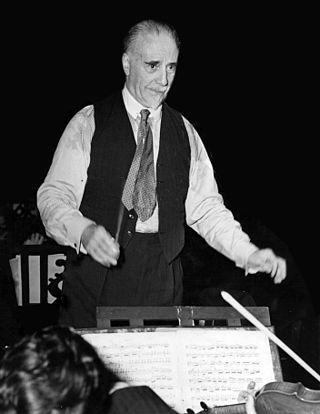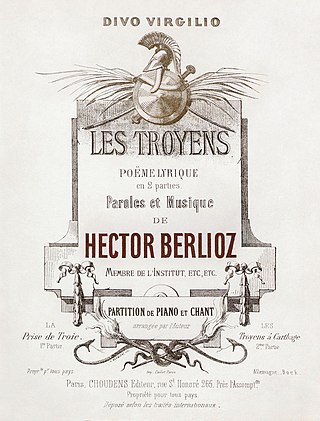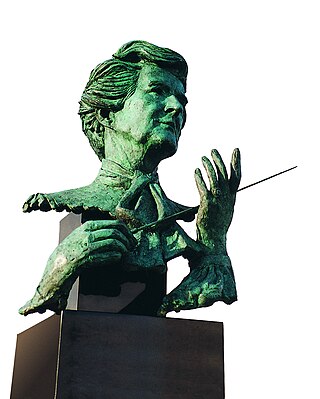
Sir Thomas Beecham, 2nd Baronet, CH was an English conductor and impresario best known for his association with the London Philharmonic and the Royal Philharmonic orchestras. He was also closely associated with the Liverpool Philharmonic and Hallé orchestras. From the early 20th century until his death, Beecham was a major influence on the musical life of Britain and, according to the BBC, was Britain's first international conductor.

Sir Colin Rex Davis was an English conductor, known for his association with the London Symphony Orchestra, having first conducted it in 1959. His repertoire was broad, but among the composers with whom he was particularly associated were Mozart, Berlioz, Elgar, Sibelius, Stravinsky and Tippett.

Alceste, Wq. 37, is an opera by Christoph Willibald Gluck from 1767. The libretto was written by Ranieri de' Calzabigi and based on the play Alcestis by Euripides. The premiere took place on 26 December 1767 at the Burgtheater in Vienna.

Benvenuto Cellini is an opera semiseria in four tableaux by Hector Berlioz, his first full-length work for the stage. Premiered at the Académie Royale de Musique on 10 September 1838, it is a setting of a libretto by Léon de Wailly and Henri Auguste Barbier, who invented most of the plot inspired by the memoirs of the Florentine sculptor Benvenuto Cellini. The opera is technically challenging and was until the 21st century rarely performed. But its overture sometimes features in orchestral concerts, as does the concert overture Le carnaval romain which Berlioz composed from material in the opera.

Béatrice et Bénédict is an opéra comique in two acts by French composer Hector Berlioz. Berlioz wrote the French libretto himself, based in general outline on a subplot in Shakespeare's Much Ado About Nothing.
Sir Richard Armstrong is an English conductor. He was educated at Wyggeston Grammar School for Boys and Corpus Christi College, Cambridge, where he was an organ scholar.

Scottish Opera is the national opera company of Scotland, and one of the five national performing arts companies of Scotland. Founded in 1962 and based in Glasgow, it is the largest performing arts organisation in Scotland.

Les Troyens is a French grand opera in five acts, running for about five hours, by Hector Berlioz. The libretto was written by Berlioz himself from Virgil's epic poem the Aeneid; the score was composed between 1856 and 1858. Les Troyens is Berlioz's most ambitious work, the summation of his entire artistic career, but he did not live to see it performed in its entirety. Under the title Les Troyens à Carthage, the last three acts were premièred with many cuts by Léon Carvalho's company, the Théâtre Lyrique, at their theatre on the Place du Châtelet in Paris on 4 November 1863, with 21 repeat performances. The reduced versions run for about three hours. After decades of neglect, today the opera is considered by some music critics as one of the finest ever written.

The Edinburgh International Festival is an annual arts festival in Edinburgh, Scotland, spread over the final three weeks in August. Notable figures from the international world of music and the performing arts are invited to join the festival. Visual art exhibitions, talks and workshops are also hosted.

Hamish MacCunn, néJames MacCunn was a Scottish composer, conductor and teacher.

Maskarade (Masquerade) is an opera in three acts by Carl Nielsen to a Danish libretto by Vilhelm Andersen, based on the comedy by Ludvig Holberg. It was first performed on 11 November 1906 at Royal Danish Theatre, Copenhagen. Maskarade has enjoyed enduring popularity in Denmark where it is considered to be the country's national opera.
Sir Alexander Drummond Gibson was a Scottish conductor and opera intendant. He was also well known for his service to the BBC and his achievements during his reign as the longest serving principal conductor of the Royal Scottish National Orchestra in which the orchestra was awarded its Royal Patronage.
John M. McCollum was an American tenor who had an active singing career in operas, concerts, and recitals during the 1950s through the 1970s. As an opera singer he performed with companies throughout North America, mostly working with second tier opera houses. He was much more successful as a singer of oratorios and other works from the concert repertoire, and enjoyed a particularly productive and lengthy relationship with the Boston Symphony Orchestra. As a concert singer he sang a wide repertoire but drew particular acclaim for his performances in the works of Johann Sebastian Bach and George Frideric Handel.

Beatrice Mary June Gordon, Marchioness of Aberdeen and Temair,, FRSAMD, commonly known as Lady Aberdeen, was a professional musician and patron of the Aberdeen International Youth Festival and founder and musical director of Haddo House Choral & Operatic Society.

Franco Leoni was an Italian opera composer. After training in Milan, he made most of his career in England, composing for Covent Garden and West End theatres. He is best known for the opera L'oracolo, written for Covent Garden but taken up successfully by the Metropolitan Opera in New York. In addition to his operas, Leoni wrote several cantatas and oratorios and many ballads and other songs. He also worked as a conductor in London, both in the concert hall and in the theatre.

Erik William Chisholm was a Scottish composer, pianist, organist and conductor sometimes known as "Scotland's forgotten composer". According to his biographer, Chisholm "was the first composer to absorb Celtic idioms into his music in form as well as content, his achievement paralleling that of Bartók in its depth of understanding and its daring", which led some to give him the nickname "MacBartók". As composer, performer and impresario, he played an important role in the musical life of Glasgow between the two World Wars and was a founder of the Celtic Ballet and, together with Margaret Morris, created the first full-length Scottish ballet, The Forsaken Mermaid. After World War II he was Professor and Head of the South African College of Music at the University of Cape Town for 19 years until his death. Chisholm founded the South African College of Music opera company in Cape Town and was a vital force in bringing new operas to Scotland, England and South Africa. By the time of his death in 1965, he had composed over a hundred works.
The RTÉ Concert Orchestra is one of the two full-time professional radio orchestras in Ireland that are part of RTÉ, the national broadcasting station. Since its formation as the Radio Éireann Light Orchestra in 1948, the RTÉ Concert Orchestra, has grown from a small studio-based recording group to become an active 45-strong orchestra performing over eighty concerts annually. It was part of RTÉ Performing Groups. The orchestra performs classical, popular and big band evening and lunchtime concerts, covering a range of music from baroque to contemporary.

University College Opera, or UCOpera, is the student opera company of University College London. The operas are staged by professional singers, directors and designers, with the orchestra and chorus drawn from the student body. Founded in 1951, UCOpera is known for its productions of rarely performed operas, including 3 world premières, and 22 British premières. On 10 March 2008 UCOpera staged the UK premiere of Édouard Lalo's Fiesque, at the Bloomsbury Theatre. 2009 saw another British première, Ernest Bloch's Macbeth. UCOpera extended its list of British premières by staging Gounod's Polyeucte at Theatre Royal Stratford East in 2018, and Smetana's Czech national opera, Libuše in 2019.

Joyce DiDonato is an American lyric-coloratura mezzo-soprano. She is notable for her interpretations of operas and concert works in the 19th-century romantic era in addition to works by Handel and Mozart.
Christopher Ventris, born 1965, in London, is a British tenor. He is particularly known for his role as Parsifal which he has performed over 100 times including performances at the Bayreuth Festival during the 2008, 2009, and 2010 Festival seasons.















